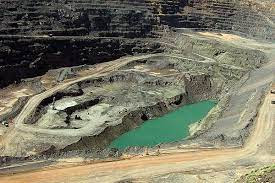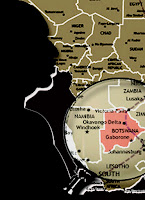Michael - Thursday
The Daily Maverick—a South African (mainly internet) daily—carried an article to this effect last week. You can access the original article at How did Botswana’s economy manage to beat South Africa’s?
Of course, we’re always interested in news about Botswana and have great respect for the country,
but this was a bit of a shock. The author of the piece, Maverick business
editor Tim Cohen, started by noting that the citizens of Botswana (Batswana)
became richer on average than South Africans in 2019 and that that situation is
still the case. It now has per capita GDP of $9,200 and South Africa has $7,200.
Cohen then goes into why this should not be
the case.
When Botswana became independent from Britain in 1966, it
had per capita GDP of $70 (!) and a total of 10km of tarred (paved) roads. (Now it has around 20,000 km of paved road.) The extent
of Britain's interest in the country and its development while it was the British Protectorate of Bechuanaland can be judged by the
fact that the administration of the country was from Mafikeng, which is not
even in Botswana. It did have a huge
windfall in that shortly after independence, De Beers discovered the world’s
richest diamond deposit near the town of Jwaneng, but Cohen points out that
single commodity economies don’t always do well over the long haul (c.f.
Venezuela with all that oil, which is a lot more useful than diamonds are). Furthermore, the country has been ruled by one
party over all that time. (Botswana has regular free and fair elections but the
Botswana Democratic Party has won all of them and a tweak in the electoral system
gives them regular comfortable majorities.) The small population (about two and
a half million) means that relatively little money goes a long way, but
economic theory does not favor small populations or one party governments, at
least not for 60 years (c.f. Zimbabwe).
Cohen doesn’t really address why this might be the case, so
I’ll have a go. (The Daily Maverick likes to stick more to facts than wild
speculation, but I can write what I like.)
 |
| Bust of Sir Seretse Khama |
 |
| Jwaneng open pit mine |
In the second place, Botswana negotiated a deal with De Beers. When Zambia nationalized its copper mines, it was essentially the end of the mining industry there. Anglo American accepted their return in the early 2000s, but had to spend years just renovating them and repairing the damage of mismanagement. The Botswana government realized that it had things it could do and things it should do, but developing diamond mines was not one of them.
In the third place, Botswana is a largely homogeneous
country. Most of the citizens are Tswana people and almost everyone speaks
Setswana and English (which remains the official language). This has avoided the
tribal conflicts that are rife in South Africa, which has a very inhomogeneous
population and eleven official
languages.
In the fourth place, I think the British did Botswana a big favor—they didn’t get involved. Botswana was never a colony. The chiefs at the time of Queen Victoria asked Britain to protect them from the encroaching South African Boer republics. The British government was starting to have its own problems there, so agreed to do so, but never had any real interest in Botswana. It was never colonized, it was never anglicized. To this day there is both traditional law and national law. The nation is an evolution from the local governance of the past. Compare that with the chaotic background in South Africa that the ANC government inherited in 1994.


















No comments:
Post a Comment